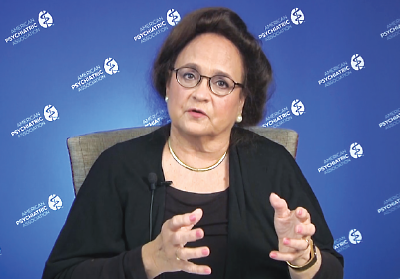The Women’s Preventive Services Initiative (WPSI) is in the midst of updating its guidelines for women’s health, for the first time with the participation of a psychiatrist.
Recommendations accepted under the WPSI umbrella are covered without copayments under the Affordable Care Act (ACA) and thus determine how much a woman pays for her health care.
Representing APA on the panel is the president of APA’s Women’s Caucus, Maureen Van Niel, M.D., a private practitioner in Cambridge, Massachusetts. She is the first mental health practitioner of any kind to be appointed to the panel.
WPSI’s origins lie in provisions of the ACA that increased the focus on preventive care. A report in 2011 from the Institute of Medicine (now the Health and Medicine Division of the National Academies of Sciences, Engineering, and Medicine) noted: “Women stand to benefit from this shift given their longer life expectancies, reproductive and gender-specific conditions, and historically greater burden of chronic disease and disability.”
That report also recommended eight preventive health care services for women:
•
Screening for gestational diabetes
•
High-risk human papillomavirus DNA testing
•
Annual counseling on sexually transmitted infections for sexually active women
•
HIV counseling and screening
•
Lactation support and counseling
•
Screening and counseling for interpersonal violence and domestic violence
•
At least one well-woman preventive care visit annually for adult women to obtain the recommended preventive services
The IOM also called for reviewing and updating these guidelines every five years, so in March the Health Resources and Services Administration (HRSA) under the Department of Health and Human Services awarded a five-year contract to the American College of Obstetricians and Gynecologists (ACOG) to manage a collaborative review process. ACOG then invited representatives of 21 other health professional organizations and advocacy groups to serve on the WPSI’s multidisciplinary steering committee.
Prior close cooperation between APA and ACOG leaders led to a request for a psychiatrist to join the panel, so CEO and Medical Director Saul Levin, M.D., M.P.A., appointed Van Niel to fill the post.
The Pacific Northwest Evidence-Based Practice Center at the Oregon Health and Science University reviewed the published research for each topic.
“Everything we do is evidenced-based,” said Van Niel in an interview. “We’re really responding to the best science, the best studies—not to anyone’s personal impressions.”
Part of Van Niel’s role has been to introduce consideration of the emotional impact of alternatives under discussion into the current round of recommendations. That might include whether some screening or its outcome might engender anxiety in patients, as may happen following a diagnosis or a false positive.
Other members of the panel have been very open to discussing the mental health aspects of each category of services, said Van Niel.
“I think for a long time people thought that the ‘medical’ problems deserved the most attention,” said Van Niel. “Only now can we see that mental health problems are also medical problems. They’re part of systems within the body and just as measuring blood sugar in a patient is important, so is assessing their mood.”
The updated draft recommendations were published September 1 for comments. They contained a number of clarifications and suggestions for implementation, including the addition of follow-up care to be provided without cost-sharing. Final recommendations will be submitted December 1 to be considered for adoption by HRSA and insurance coverage under the ACA.
For instance, gestational diabetes coverage would go beyond screening to include care throughout pregnancy, as well as supplies, counseling, and education. Coverage for interpersonal and domestic violence screening would expand to include a “broad range of services that may be needed to help adolescents and women in these circumstances.”
There is one entirely new recommendation, covering breast cancer screening for average-risk women. It calls for screening mammography every one or two years for women at average risk, coupled with an informed decision-making process covering the benefits and harms of different screening intervals, with consideration of “patient values and preferences.”
Van Niel intends to expand her role—and psychiatry’s—within WPSI as time goes by.
“In future years, I hope to specifically suggest including coverage of primary mental health problems that occur only in women, such as perinatal mood or anxiety disorders or conditions arising during menarche, pregnancy, or menopause,” she said. ■
The Women’s Preventive Services Initiative website can be accessed
here.

